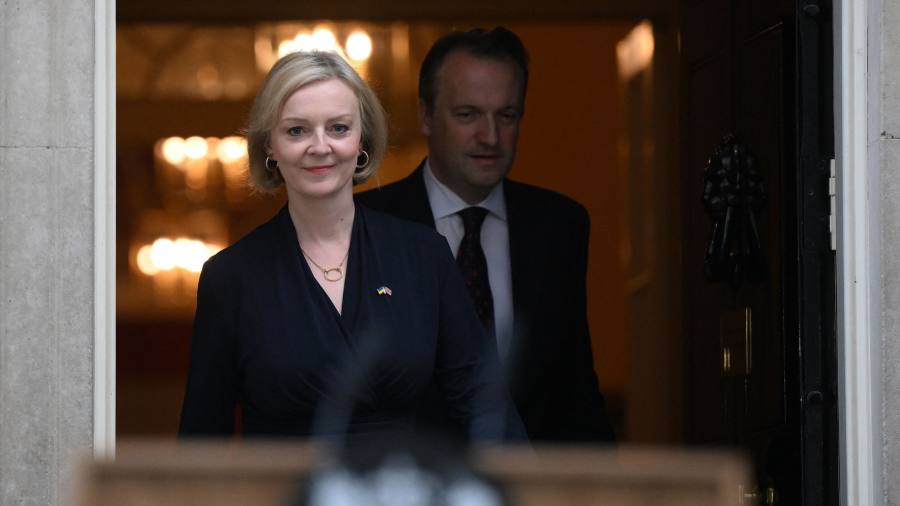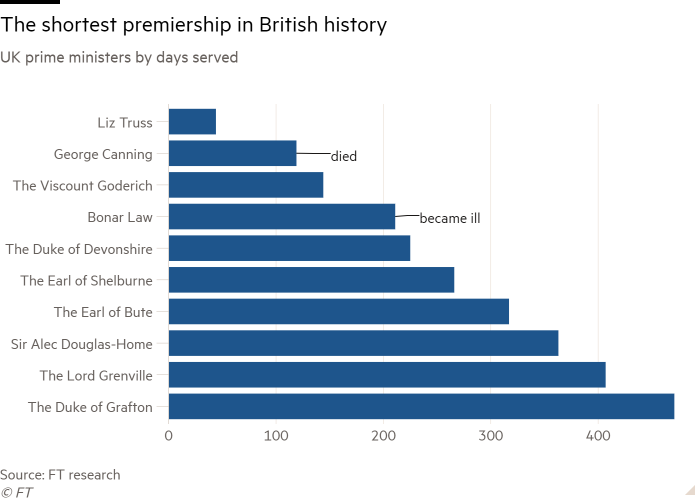
This article is an on-site version of our Inside Politics newsletter. Sign up here to get the newsletter sent straight to your inbox every weekday.
Good afternoon. It’s here: our special resignation edition of Inside Politics! The nation’s prime minister has quit again, this time after just 44 days in office.
Inside Politics is edited by Georgina Quach. Follow Stephen on Twitter @stephenkb and please send gossip, thoughts and feedback to [email protected].
A unity candidate? In this party? At this time of year?
Liz Truss is out as prime minister and her successor will take office next week after a short, sharp leadership contest. Speaking outside the House of Commons, Sir Graham Brady, chair of the Tory backbench 1922 committee, said the aim was for “the whole thing to happen, including the party being consulted, by next Friday”.
Her replacement will be the UK’s fifth prime minister since the Conservative party returned to power 12 years ago, and the fourth since the Brexit referendum a little over six years ago.

That reflects the deep and enduring instability and perhaps ungovernability within the Conservative party. In the end, Tory MPs weren’t even capable of forming a coherent organisation to get rid of their fourth prime minister: Truss chose to exit rather than being forced out.
Now, some of the reasons for Truss’s swift exit are solely and wholly down to her: the total collapse in the Conservative party’s opinion poll rating and the turbulence in financial markets can both be traced back to decisions taken by her and her first chancellor, Kwasi Kwarteng.
But not all. The big story of the past six years is that Conservative MPs’ attempts to get rid of their leaders have become more frequent but also less well-organised. The attempt to get rid of Theresa May — third shortest-serving premier in the past 12 years — was driven by Boris Johnson and the European Research Group. Johnson’s eventual exit was the result of the resignation of Rishi Sunak and a host of other fiscal hawks, alongside the exit of Sajid Javid and other ministers concerned about his character.
The attempt to get rid of Truss was essentially leaderless. A more shameless prime minister, with less consideration for the damage her continued presence in government was doing to her party, could have held on for longer.
That reflects the big problem facing Truss’s replacement, whoever they may be: is this a party capable of unifying around any real-world programme? This is a party that has, since the UK voted to leave the EU, voted against the spending cuts of Philip Hammond, rejected the tax rises of Sunak, driven itself towards the tax-cutting excess of Kwarteng and may now reject the return of austerity under Jeremy Hunt. It opposes higher inflation and dislikes higher interest rates. It wants a balanced budget but endeavours to keep taxes low and spending unchanged. It wants to be pro-growth but also to have a distant and at times hostile relationship with its nearest trading bloc.
These aren’t problems that can be settled with a “unity” candidate and I’m not convinced they are problems that can be settled with a swift leadership contest either. The Conservative party remains bitterly divided, perhaps irrevocably so. But those divides can’t be overcome without one side winning a decisive victory — an outcome which has virtually no prospect of happening, given the circumstances of this contest.
There will be no hurricane
In yesterday’s newsletter, I wrote:
Nonetheless — and as I write this I am aware this may turn out to be one of the stupidest things I have ever written — I am dubious that she will be removed any time soon.
Well, I was half-right. Some more thoughts on that at the end of the year, when I will postmortem all the things I got wrong over the course of 2022.
Our weekly Britain after Brexit newsletter, helmed by public policy editor Peter Foster, will shed more light on the chaos. If you’ve got premium FT access, sign up here to receive it when it lands at 5pm.
The latest stories
-
Rip it up | Sir Keir Starmer has called for a general election as he confirmed today that a Labour government would repeal legislation that makes it harder for workers to take strike action.
-
No uncertain terms | The resignation of Liz Truss as UK prime minister is a step that “needed to happen”, economists warn as the country seeks to restore its financial credibility and stability. Our live blog will keep updating with the latest news from the fallout.
-
How to fight inflation | The Bank of England’s deputy governor for monetary policy has cast doubt on financial market projections that UK interest rates need to rise to more than 5 per cent to bring down inflation. Ben Broadbent suggested smaller increases could be sufficient.
-
Not a market ‘game changer’ | UK government bonds shrugged off the resignation of Liz Truss this afternoon, after rallying in the lead-up to her statement, while sterling held on to its gains against the dollar.
Recommended newsletters for you
Swamp Notes — Expert insight on the intersection of money and power in US politics. Sign up here
Britain after Brexit — Keep up to date with the latest developments as the UK economy adjusts to life outside the EU. Sign up here